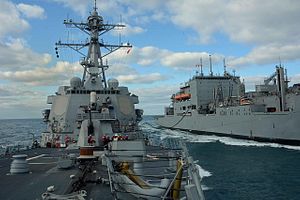After months of hand-wringing, on October 27 the U.S. Navy finally began to assert its right to patrol within 12 nautical miles of at least some of China’s reclaimed features in the Spratly Islands. Observers are rightly zeroing in on Beijing’s response. Every detail of the at-sea intercept and Chinese official statements will scrutinized for clues as to how it may react to what will likely be a continuous campaign of freedom of navigation operations (FONOPS) in the coming weeks or months.
But it is important to not lose sight of the rest of the region. A secondary objective of the mission is to prove Washington’s credibility as an effective (as well as responsible) security provider. American diplomats and military officials worked hard behind closed doors to garner support before playing a card many consider risky and provocative. On the other hand, the United States is also reportedly taking this opportunity to challenge what it views as excessive maritime claims by some of its own allies and partners.
The following is a breakdown of initial reactions by American treaty allies in the Asia-Pacific by order of public endorsement.
The Philippines
President Benigno Aquino III offered the most full-throated support. Responding to questions at a forum, the president said he saw “no issue” with the United States exercising freedom of navigation in accordance with international law. He further argued that the FONOP signaled the United States and its friends do not accept China’s de facto revision of the status quo and would help establish a “balance of power” characterized by an openness and pluralism. Asked if Manila was assisting Washington, Aquino cited his administration’s pending arbitration case and vocal opposition to Chinese maritime activities. One newspaper reported that Manila had actually sent a surveillance aircraft to survey the USS Lassen’s expected route, suggesting close coordination with the United States.
The government seems unfazed by reports that the U.S. Navy either did or will be conducting FONOPS through the 12-nautical mile limit of features claimed or occupied by the Philippines and Vietnam, in addition to China.
Australia
In a written statement, Defense Minister Marise Payne strongly endorsed the right of the United States and all nations to freedom of navigation and overflight in the South China Sea. She reiterated Australia’s interest in regional peace and stability and unimpeded commerce. Although Australia is not involved in the current FONOP, Payne stated that Canberra would continue to “cooperate closely with the United States and other regional partners on maritime security.” Apparently, Australia also delayed or canceled a pre-planned naval exercise with the PLA Navy scheduled to take place next week in the South China Sea.
Analysts are divided over whether Australia will face pressure to join U.S.-led FONOPS in the near future. It could also conduct its own patrols or overflight. During October 13 AUSMIN consultations, U.S. Secretary of State John Kerry and Defense Secretary Ashton Carter briefed their Australian counterparts on the mission, but Trade Minister Andrew Robb quickly announced that Canberra would not be participating. The new Australian prime minister, Malcolm Turnbull, is thought to be less willing than his hawkish predecessor to confront China directly.
Japan
Tokyo’s top government spokesperson, Chief Cabinet Secretary Yoshihide Suga, initially declined to give direct comments on the patrol. Instead, he highlighted Japan’s general commitment to “the aim of preserving free and peaceful waters” and opposition to land reclamation, militarization, and other unilateral attempts to change the status quo. By way of explanation, Suga said Japan would simply not comment on “each operation” the United States launches, though the government remains “in close contact” with Washington.
Defense Minister Gen Nakatani stated that while the South China Sea is a vital national security interest for Tokyo, it was still deciding “how to proceed.” Finally, reports surfaced that Prime Minister Shinzo Abe had expressed his support for the U.S. move and promised Japan would “cooperate with international society, including the United States, our ally.”
Many believe Tokyo, like Australia, may still be asked to join future operations in the South China Sea, especially because of its professed willingness to do so and its participation in high-profile maritime drills with the Philippines in June. Then again, the FONOP comes hot on the heels of the passage of Abe’s controversial security legislation. Wading deep into troubled waters could prove too politically delicate at this time.
South Korea
Noh Kwang-il, spokesperson for the Republic of Korea’s Foreign Ministry, tiptoed around the U.S. FONOP. Avoiding a direct comment on the mission, he nevertheless emphasized the importance of freedom of navigation and the 2002 ASEAN-China Declaration on the Conduct of Parties to regional peace and stability.
South Korea’s unwillingness to come out more forcefully against Chinese assertiveness has persistently disappointed U.S. alliance managers. Obama brought this frustration out into the open this month during President Park Geun-Hye’s visit to the White House, when he publicly rebuked South Korea for failing to “speak out” on China’s violation of international laws and norms.
Other Regional Stakeholders
Beyond the sphere of U.S. treaty allies, senior Taiwanese and Indonesian officials also voiced little public endorsement in the immediate aftermath of the FONOP, instead calling for the peaceful resolution of disputes and exercise of restraint by all parties. There was no immediate reaction from Vietnam, Malaysia, or India.
Jake Douglas is a research assistant in the Japan Chair at the Center for Strategic and International Studies. He is a former congressional Boren Scholar and graduate of the College of William & Mary.

































